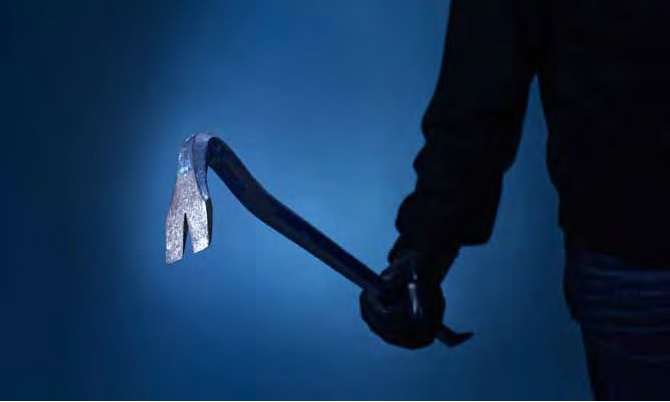Physical security essential throughout winter months
Now that British Summer Time (BST) has officially come to an end, we will start to see extended hours of darkness, which can often leave properties vulnerable to opportunistic criminals. Here, James Kelly, Chief Executive of the British Security Industry Association (BSIA), discusses the importance of physical security measures in deterring crime.
Recent statistics, based on interviews between July 2015 and July 2016 , from the Crime Survey for England and Wales revealed that burglary offences have decreased by 2% with 398,406 recorded offences. Interestingly, however, the fear of being burgled is still a very real issue. Research conducted by Churchill Home Insurance found that 6.9 million people were concerned about being burgled, emphasising the fact that having effective security measures in place should take priority for home and business owners.
Physical security measures can be seen as the foundation of any home, business or organisation. When it comes to fully securing a property, it is beneficial to take a holistic approach in order to fully consider the risks that the property faces and determine the best ways to mitigate them. Physical security is often seen as the backbone of security, with even the simplest of measures making a big difference in defending against unwanted intruders. For example, doors should be of a high quality, complying with British Standard PAS 24-1 ‘Doors of Enhanced Security’. This standard sets the minimum requirements that both doors and windows should meet in order to provide an appropriate level of security. This ensures that these measures are fit for purpose and have been assessed against an array of key performance markers, including, but not limited to, weather tightness, strength and operation. Doors should also be solid in their construction and should not have the ability to be easily smashed or ripped away from any locks, hinges or hinge bolts. The locks themselves should be of a high-standard, with five-lever mortise locks being fitted to doors and high quality locks fitted to all windows of premises.
Every detail can make a big difference in preventing crime, glass, for example, should be carefully considered when choosing glass doors or windows. Glass can often act as a weak point in terms of breakability and visibility, allowing potential intruders to look into a property and make plans for intrusion. Where glass is used, preventative physical measures such as frosting or tinting, can add a more robust layer of both security and privacy. In the cases of commercial properties, steel shutters and perimeter fencing can also be a successful deterrent.
Another type of property that can find themselves particularly more vulnerable during the winter months is that of vacant properties. Vacant properties, whether they are commercial or residential, find themselves at a heightened risk for a variety of factors such as fire, deterioration, squatting, fly tipping and criminal activity. Discussing the impact that winter weather can have on vacant properties, Gideon Reichental, Chairman of the BSIA’s Vacant Property Protection Section, explained that “squatters and travellers are still prevalent.” While squatting in residential properties is illegal, “squatting in commercial property is not illegal, and the cold wet weather will act as incentive for those seeking somewhere to live.” From a maintenance point of view, Gideon commented that the theft of metal such as copper and lead can also “have knock-on consequences such as water ingress through damaged roofing, especially during the winter months, and flooding if water systems have not been shut off and drained down.”
“Vacant sites still act as a magnet for those with little to occupy themselves, and graffiti usually marks the beginning of a campaign of activity that can result in broken windows, general vandalism and fires being lit” he continued. “The darker evenings act as cover for those that will use the vacant property as a place to hang-out which, apart from being a risk to the property, also represents a public liability risk to the owners in the event that someone should injure themselves on site. From this perspective, it is essential the perimeter is secure, that there is plenty of warning signage and activity can be easily monitored.”
That being said, physical security measures can go a long way in helping to secure vacant properties. Alongside physical and electronic measures, such as perimeter fencing, steel shutters and doors, CCTV and alarm systems, a physical presence in the form of a security guard or a property guardian can also be extremely beneficial.
On the subject of property guardianship, Gideon explained that “BSIA members also lead the market in experience and best practice of ‘protection through occupation’ using guardians.” Property guardianship is a method of vacant property protection that has become more popular in recent years. A guardian is a person who temporarily occupies an empty property in order to prevent against squatting and theft, while also assisting with general maintenance of the building. While they do pay a licence fee, they do not have any tenancy rights so can conveniently vacate the property whenever the owner may need it to be returned for development, refurbishment or sale.
Regardless of what kind of physical security measure is chosen, as always, it is most effective to source a product or solution from a reputable provider. It is important to be aware of any British or European standards that the product should meet with, as low quality products can have detrimental effects and result in financial losses in the future. Members of the BSIA are all inspected to these quality standards and offer a reliable, professional service. To find out more visit https://www.bsia.co.uk/home.aspx#
